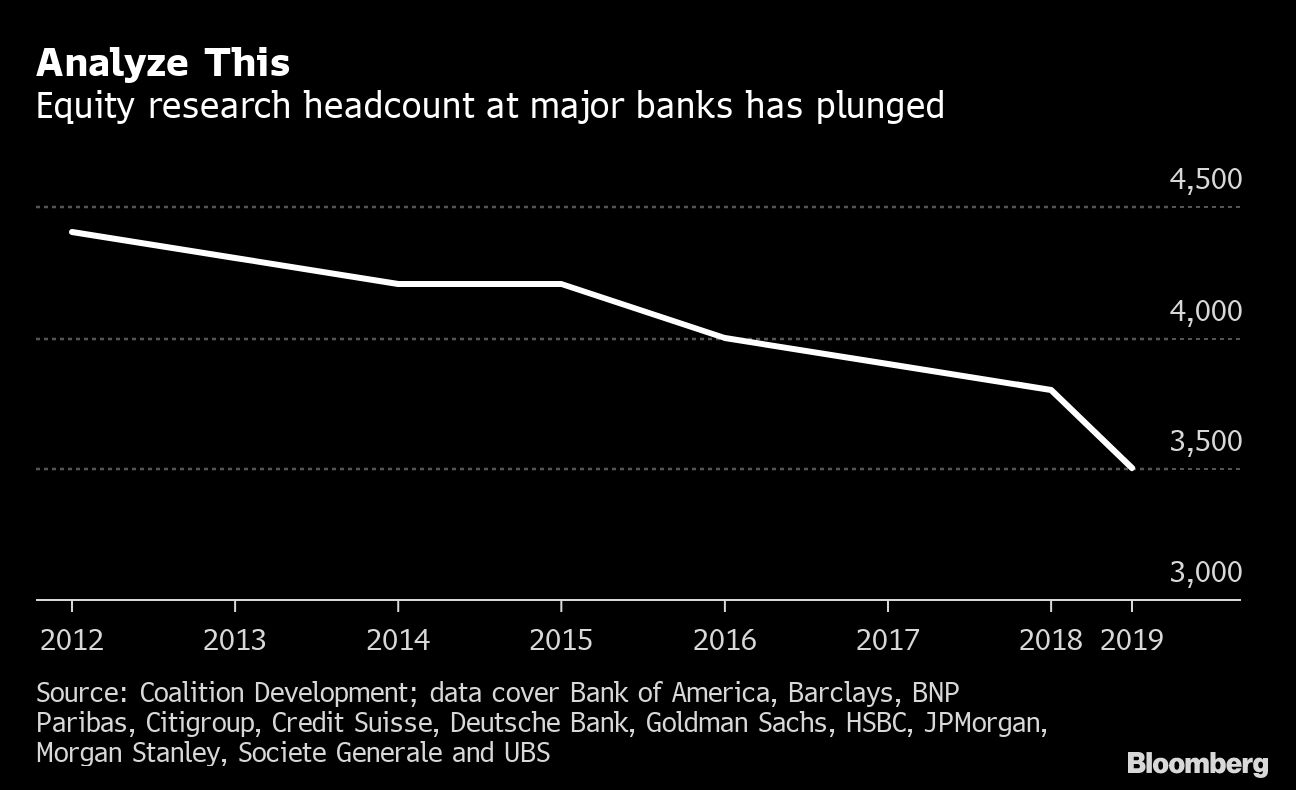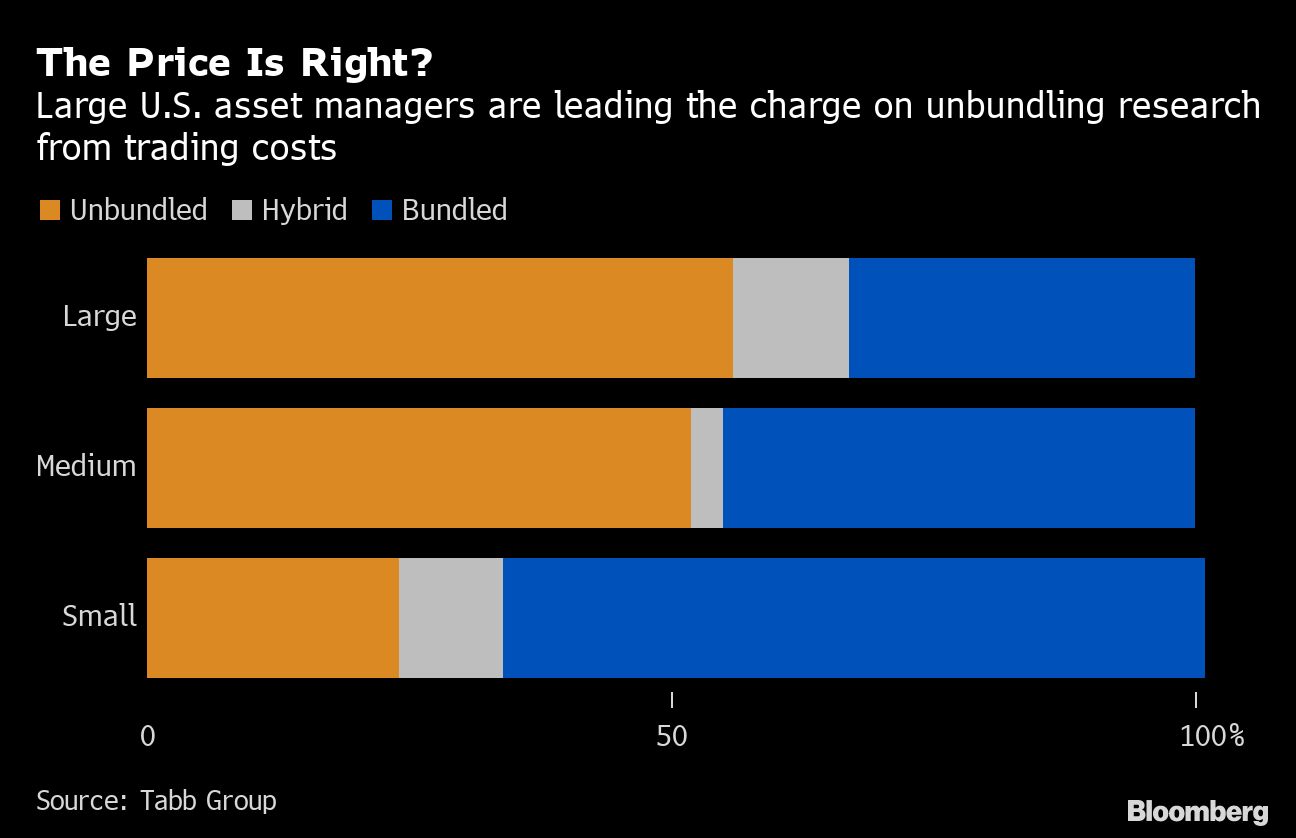

 Research is the niche that's been buffeted most violently by the forces crashing into the finance industry: technology, regulation and the demands of the marketplace itself. Machines are doing a lot more of the work and investors are piling into passive funds. But it's European rules known as MiFID II that are behind the most recent wave of job cuts.
"We seem to be looking at a moment in history where a lot of these forces are coming together quite acutely," said Mr. Howell, whose last stop on Wall Street was as a frontier-markets strategist. "MiFID is almost like the icing on the cake."
Research spending by the buyside has dropped between 20% and 30% since the new rules came in, U.K. regulators said earlier this year. Mike Carrodus, founder of Substantive Research, which monitors content and pricing, estimates 2020 budgets will be down another 20% to 30%.
MiFID — which stands for Markets in Financial Instruments Directive — upended the sector's economics by forcing research costs to be separated from trading fees. That meant both buyers and sellers had to justify the expense.
Now, armed with data amassed from tracking calls and meetings, asset managers also have a better sense of the worth of each analyst — fairly or not.
"The buyside understands where the leverage is," Mr. Carrodus said.
There's no end in sight as the U.S. accepts the new norms. There aren't similar rules emanating from Washington, but fund-management giants from MFS Investment Management to T. Rowe Price Inc. are paying for research out of pocket worldwide instead of passing it on to clients. MFS, which oversees more than $400 billion, pioneered a model of reimbursing clients for research costs to standardize practices globally.
[More: Morgan Stanley fires broker for stealing thousands of clients' data]
In November, the U.S. Securities and Exchange Commission extended a three-year reprieve allowing American banks to charge European clients for research — a sign regulators were not about to import the rules wholesale.
Research is the niche that's been buffeted most violently by the forces crashing into the finance industry: technology, regulation and the demands of the marketplace itself. Machines are doing a lot more of the work and investors are piling into passive funds. But it's European rules known as MiFID II that are behind the most recent wave of job cuts.
"We seem to be looking at a moment in history where a lot of these forces are coming together quite acutely," said Mr. Howell, whose last stop on Wall Street was as a frontier-markets strategist. "MiFID is almost like the icing on the cake."
Research spending by the buyside has dropped between 20% and 30% since the new rules came in, U.K. regulators said earlier this year. Mike Carrodus, founder of Substantive Research, which monitors content and pricing, estimates 2020 budgets will be down another 20% to 30%.
MiFID — which stands for Markets in Financial Instruments Directive — upended the sector's economics by forcing research costs to be separated from trading fees. That meant both buyers and sellers had to justify the expense.
Now, armed with data amassed from tracking calls and meetings, asset managers also have a better sense of the worth of each analyst — fairly or not.
"The buyside understands where the leverage is," Mr. Carrodus said.
There's no end in sight as the U.S. accepts the new norms. There aren't similar rules emanating from Washington, but fund-management giants from MFS Investment Management to T. Rowe Price Inc. are paying for research out of pocket worldwide instead of passing it on to clients. MFS, which oversees more than $400 billion, pioneered a model of reimbursing clients for research costs to standardize practices globally.
[More: Morgan Stanley fires broker for stealing thousands of clients' data]
In November, the U.S. Securities and Exchange Commission extended a three-year reprieve allowing American banks to charge European clients for research — a sign regulators were not about to import the rules wholesale.
 About half of U.S. managers still keep fees bundled, with larger firms leading the charge on unbundling, according to a Tabb Group survey released in September. U.S. equities commissions have already dropped about 42% in the four years through 2019, due to factors including research, Tabb estimated.
"There's a symbiotic thing going on here, which is: we should be more transparent to our end investors, and we should be more prudent with the money that they give us to do this," said Mr. Carrodus. "Everyone has to justify what they need."
It's not all doom and gloom. Some banks are taking advantage of the retrenchment. Goldman Sachs Group Inc. hired new analysts this year to "get a bigger piece of what is overall a smaller pie," said Jim Covello, Goldman's global co-head of single-stock research.
Dwindling sell-side research may finally settle the question of its value. U.S. managers spend between three to six times more on research than their European peers, Neil Scarth at Frost Consulting estimates. An analysis by Evercore ISI and Frost argued that firms paying for analysis out of their own pockets generally underperformed last year, suggesting they're being penny-wise and pound-foolish.
Eventually, the cuts will stop. Larry Tabb, founder of Tabb Group, sees research providers consolidating and resourceful asset managers beefing up their internal analysis. The question is where that leaves the rest, as well as small-caps that may consequently receive less attention from Wall Street.
And it will be too late for folks like Mr. Howell, who is flummoxed to see his career vanish even as stock markets reach all-time highs.
[More: Commending Finra on its efforts to improve its exam program
"I don't think equity research will go away, by any means," he says. "There's definitely still a need for it, but at the end of the day it's going to be a fair amount smaller than it is even now."
[Recommended video: Why advisers are slow to recognize the world moving toward ESG]
About half of U.S. managers still keep fees bundled, with larger firms leading the charge on unbundling, according to a Tabb Group survey released in September. U.S. equities commissions have already dropped about 42% in the four years through 2019, due to factors including research, Tabb estimated.
"There's a symbiotic thing going on here, which is: we should be more transparent to our end investors, and we should be more prudent with the money that they give us to do this," said Mr. Carrodus. "Everyone has to justify what they need."
It's not all doom and gloom. Some banks are taking advantage of the retrenchment. Goldman Sachs Group Inc. hired new analysts this year to "get a bigger piece of what is overall a smaller pie," said Jim Covello, Goldman's global co-head of single-stock research.
Dwindling sell-side research may finally settle the question of its value. U.S. managers spend between three to six times more on research than their European peers, Neil Scarth at Frost Consulting estimates. An analysis by Evercore ISI and Frost argued that firms paying for analysis out of their own pockets generally underperformed last year, suggesting they're being penny-wise and pound-foolish.
Eventually, the cuts will stop. Larry Tabb, founder of Tabb Group, sees research providers consolidating and resourceful asset managers beefing up their internal analysis. The question is where that leaves the rest, as well as small-caps that may consequently receive less attention from Wall Street.
And it will be too late for folks like Mr. Howell, who is flummoxed to see his career vanish even as stock markets reach all-time highs.
[More: Commending Finra on its efforts to improve its exam program
"I don't think equity research will go away, by any means," he says. "There's definitely still a need for it, but at the end of the day it's going to be a fair amount smaller than it is even now."
[Recommended video: Why advisers are slow to recognize the world moving toward ESG]

Most firms place a limit on advisors’ sales of alternative investments to clients in the neighborhood of 10% a customer’s net worth.

Those jumping ship include women advisors and breakaways.

Firms in New York and Arizona are the latest additions to the mega-RIA.

The agent, Todd Bernstein, 67, has been charged with four counts of insurance fraud linked to allegedly switching clients from one set of annuities to another.

“While harm certainly occurred, it was not the cataclysmic harm that can justify a nearly half billion-dollar award to the State,” Justice Peter Moulton wrote, while Trump will face limits in his ability to do business in New York.
Orion's Tom Wilson on delivering coordinated, high-touch service in a world where returns alone no longer set you apart.
Barely a decade old, registered index-linked annuities have quickly surged in popularity, thanks to their unique blend of protection and growth potential—an appealing option for investors looking to chart a steadier course through today's choppy market waters, says Myles Lambert, Brighthouse Financial.
